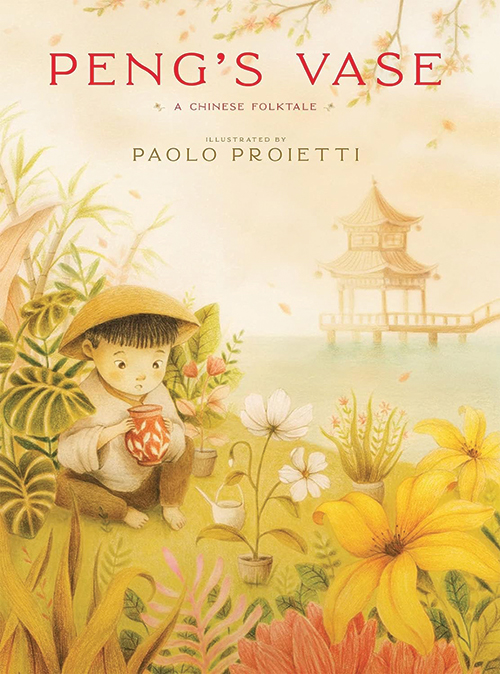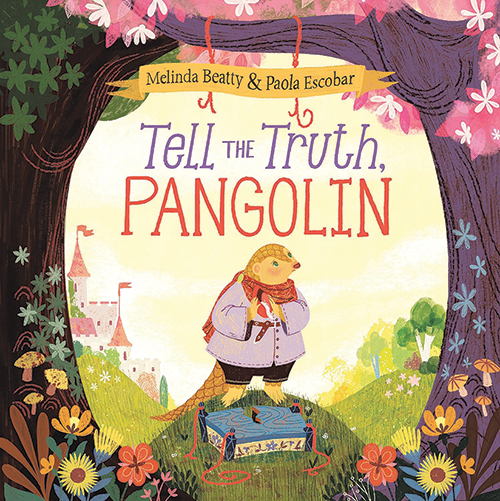
Peng’s Vase: A Chinese Folktale AND Tell the Truth, Pangolin
Reviewed by Paul Buckley
December 1, 2023
Retold by Angus and Michael Yuen-Killick, illustrated by Paolo Proietti. Red Comet Press, 2023. 28 pages. $18.99/hardcover; $10.99/eBook. Recommended for ages 4–8.

By Melinda Beatty, illustrated by Paola Escobar. Anne Schwartz Books, 2022. 40 pages. $18.99/hardcover; $8.99/eBook. Recommended for ages 4–8.
Good children’s books that are centered on truthfulness are scarce, but we are blessed with two very different ones. Both feature a main character in a situation where telling the truth is difficult.
In a faithful retelling of an ancient Chinese folktale, Peng faces a dilemma. The emperor is old and childless, so he has decided to choose a successor from among the children. Calling them together, he gave each child a single seed and instructed them to nurture it for a year. After that time, they were to return to the palace and show what had grown. Despite careful and loving care, Peng’s seed has failed to even germinate. To avoid public humiliation, he tells his parents he doesn’t want to return to the palace. They tell Peng he should go and tell the emperor that he tried his best, but failed.
Each of the other children arrive carrying luxuriant plants with colorful flowers. The emperor inspects each one, but when he sees Peng’s vase and hears his report, he declares Peng his heir, and discloses that the seeds he distributed could never sprout. Honesty and bravery are the qualities he sought in his successor. Only Peng had the courage to bring an empty vase and tell the truth.
This is a story that pre-readers can follow, with a lesson they can understand. The sparse text is brought to life in Paolo Proietti’s gentle, welcoming illustrations with the expressions on the characters’ faces clearly revealing their feelings. Peng’s Vase could serve as a great invitation for children in a First-day school class to share their own moments of doubt and uncertainty, opening them to a discussion of courage and truthfulness.
A pangolin is a small, endangered mammal that lives in the forests and grasslands of Africa and Asia. Tell the Truth, Pangolin is set in a royal court and starts with a crisis. Pangolin is in trouble! He was playing on the royal swing when the ropes broke. He knows he has to tell the Queen, but what will he say?
While Peng depended on the good advice of his parents for guidance, Pangolin instead turns to his friends: Badger, Goose, Fox, Cat, and Pug. Their suggestions range from the impractical (a musician in need of new strings took the ropes) to the absurd (alien abduction). But when Pangolin attempts to follow their directions, he becomes flustered and confused. The wise Queen asks Pangolin what is troubling him. His stammering confession is rewarded with forgiveness and a chance to make things right. Paola Escobar’s vivid illustrations are captivating. They carry us through a story that jumps brightly from scene to scene.
Both of these books offer opportunities for engagement with the minds of young readers. While Peng’s fable lends itself easily to a teaching moment, Pangolin’s fanciful stories are certainly more entertaining and can lead into a discussion about the costs of lying.
Paul Buckley has written numerous articles and books on Quaker history, faith, and practice. He worships with Clear Creek Meeting in Richmond, Ind., and travels in the ministry urging spiritual renewal among Friends. His most recent book is Primitive Quakerism Revived: Living as Friends in the Twenty-First Century.



Comments on Friendsjournal.org may be used in the Forum of the print magazine and may be edited for length and clarity.